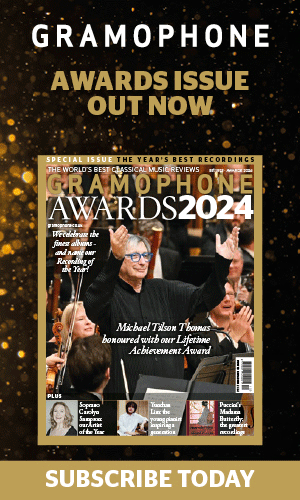
To understand the surge of popular support that made the Minnesota Orchestra Gramophone’s 2021 Orchestra of the Year, it may help to flash back eight years to the darkest days of the orchestra’s 118-year history.
In early October of 2013, in the midst of a management lockout of musicians that had already cancelled the 2012-13 season, Music Director Osmo Vänskä announced his resignation, saying goodbye to the orchestra’s musicians and its audiences with three concerts at Minneapolis’s Ted Mann Concert Hall. Despite the hopefulness expressed in the music of Mozart, Beethoven and Stravinsky, the concerts bore a tone of tragedy, a palpable grief permeating the hall. Tears flowed.
It was then that I came to recognise more fully the deep bond that Minnesota Orchestra audiences had forged with Vänskä. The Finnish conductor had arrived in Minneapolis 10 years earlier, and had transformed a respected local cultural institution into an expert orchestra that unleashed torrents of emotion and sparked unexpected insights. Veteran concert-goers marvelled at the freshness brought to the familiar by Vänskä and the orchestra.
Visits to New York’s Carnegie Hall in 2010 and 2011 had inspired The New Yorker’s Alex Ross to say that the orchestra sounded ‘like the greatest orchestra in the world’, and the New York Times’s James Oestreich had them ‘sounding like one of America’s finest’. But the orchestra’s board was out to slash payroll, so it approved a lockout in 2012.
When the orchestra’s management cancelled Carnegie Hall concerts in 2013, Vänskä resigned. In January of 2014, the orchestra won the Grammy Award for ‘Best Orchestral Performance’ for a recording of Sibelius’s First and Fourth Symphonies, but no one was present to accept it. The lockout ended later that week. Payroll was reduced, but not by as much as proposed by the board chair and president (who were soon gone), and Vänskä agreed to return.
That Sibelius recording was around the midpoint of three symphonic cycles Vänskä and the Minnesota Orchestra have almost completed for the BIS label. It was Beethoven that first put them on the international radar with rave reviews and shortlists for Grammys and Gramophone Awards, the Sibelius cycle receiving nominations for one award or the other for each of the recordings. They’re currently in the midst of the Mahler symphonies, with the Eighth and Ninth slated for spring sessions.
Thrilling as those recordings are, there’s nothing quite like experiencing Vänskä and the orchestra in concert. The conductor is a bouncing bundle of energy on the podium when the music reaches its energetic apex, his forceful cues seeming to set off explosions within the orchestra, his interpretations imaginative and inspiring.
Increased recognition of the orchestra’s artistry has been enhanced by touring. They visited 11 European cities in 2004, played the BBC Proms for the first time in 2006, and, most memorably, were the first major American orchestra to visit Cuba (2015) and South Africa (2018). Alas, a 2020 trip to Vietnam and South Korea was scotched by the pandemic.
When the world’s eyes turned toward Minneapolis when George Floyd was murdered by a police officer in May 2020, the orchestra severed its relationship with the city’s police department, which had provided security at concerts. It also re-examined its concert programming. When it started performing outdoor concerts that summer, Black composers (mostly American) were included on almost every programme. That trend continued when it live-streamed concerts from an empty Orchestra Hall during the 2020-21 season and after audiences were allowed inside the hall again for its summer 2021 concerts.
Vänskä will depart in 2022 after 19 years, with much of his final season’s repertoire demonstrating the expertise the orchestra has honed under his leadership: Beethoven in the fall, a Sibelius festival in the winter, and a Mahler spring. It may prove the ideal culmination of a powerful relationship between not only music director and musicians, but between a conductor and a community. Rob Hubbard
Minnesota Orchestra: Orchestra of the Year 2021 playlist
Listen to our ‘Minnesota Orchestra: Orchestra of the Year 2021’ playlist exclusively on Apple Music. If you are not yet a subscriber to Apple Music, it is free for the first month, boasts a catalogue of more than 75 million songs and offers lossless streaming, as well as albums in Spatial Audio. We've produced a guide to introduce the immersive listening experience of Spatial Audio here: Apple Music's spatial audio with Dolby Atmos – what is it and how do you get it?
Gramophone Awards 2021 – Recording Categories
Chamber
Choral
Concerto
Contemporary
Early Music
Instrumental
Opera
Orchestral
Piano
Song
Voice & Ensemble

Gramophone Digital Club
- Digital Edition
- Digital Archive
- Reviews Database
- Full website access
From £8.75 / month
Subscribe
Gramophone Full Club
- Print Edition
- Digital Edition
- Digital Archive
- Reviews Database
- Full website access
From £11.00 / month
Subscribe
If you are a library, university or other organisation that would be interested in an institutional subscription to Gramophone please click here for further information.





